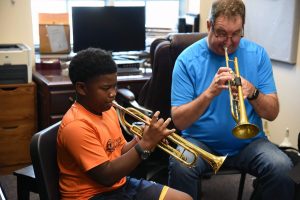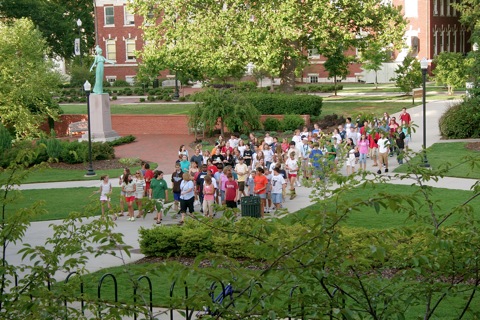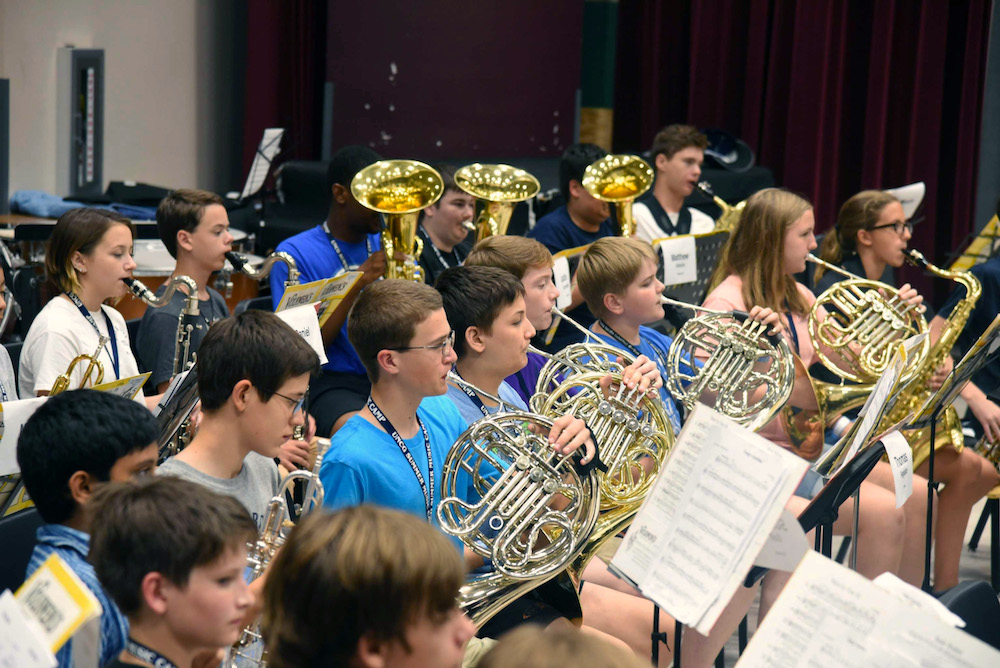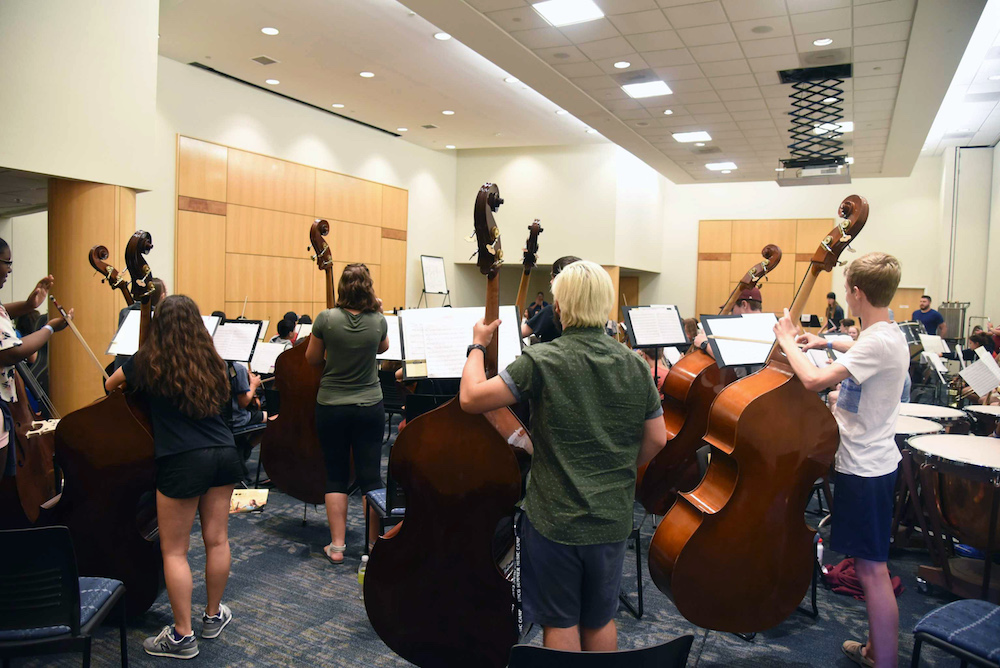 Your positive response to our camp has been both overwhelming and gratifying. For many years, the UNCG Summer Music Camp has ranked as the largest university sponsored music camp in America. Of primary importance to us, however, is maintaining a reputation for providing musical experiences of the highest possible quality within the financial reach of most families. We are very proud of the teaching and counseling staff at Summer Music Camp, so many of whom are from the UNCG School of Music. We believe that our conductors, teachers, performers, and counselors are representative of the very finest to be found anywhere. To demonstrate that belief, we include in the camp concert program a brief biographical sketch of each and every member of the UNCG Summer Music Camp Staff. As you will discover, every single person associated with our camp is a musician and music educator. Many of our 170 camp staff members hold advanced degrees in music and merit regional, national and international acclaim. The quality and dedication of our staff is the single greatest strength of the UNCG Summer Music Camp.
Your positive response to our camp has been both overwhelming and gratifying. For many years, the UNCG Summer Music Camp has ranked as the largest university sponsored music camp in America. Of primary importance to us, however, is maintaining a reputation for providing musical experiences of the highest possible quality within the financial reach of most families. We are very proud of the teaching and counseling staff at Summer Music Camp, so many of whom are from the UNCG School of Music. We believe that our conductors, teachers, performers, and counselors are representative of the very finest to be found anywhere. To demonstrate that belief, we include in the camp concert program a brief biographical sketch of each and every member of the UNCG Summer Music Camp Staff. As you will discover, every single person associated with our camp is a musician and music educator. Many of our 170 camp staff members hold advanced degrees in music and merit regional, national and international acclaim. The quality and dedication of our staff is the single greatest strength of the UNCG Summer Music Camp.
HOUSING & MEALS
 Camp students, except day campers, will be housed in air-conditioned UNCG residence halls and will eat all meals in the nearby University Dining Hall. Campers must bring their own sheets, towels, and pillow from home.
Camp students, except day campers, will be housed in air-conditioned UNCG residence halls and will eat all meals in the nearby University Dining Hall. Campers must bring their own sheets, towels, and pillow from home.
Nearly all campers are housed two students per room. Most come with a roommate in mind and we pair those students together. Those that do not come with a roommate pre-selected will receive one at check-in. We do our very best to house them with someone their own age or within one year of their age. Housing for Friday night, at the end of camp, is not provided.
Meals begin with dinner on Sunday and end with dinner on Friday – 16 meals in all. All meals will be served the main Dining Hall with an enormous “food court”-like selection to handle every possible taste. There is something for everyone and it is impossible to go hungry. Our dining staff is equipped and prepared to handle special dietary needs.
While staying in the UNCG residence halls, all music camp students will be under the careful supervision of the Music Camp Staff. More than 80 counselors will be living with the campers each week and will closely monitor all aspects of camp life.
HEALTH CARE
In the event of an illness or injury to a student at camp, the staff will escort that student to the Summer Music Camp Registered Nurse for prompt, professional medical care. We employ three or four Registered Nurses during the two one-week camp sessions and they are stationed in one of the dorms from 7:00 am until 11:00 pm each day.
Each camp student completes a Medical History & Permission for Treatment Form, signed by a parent, and that information resides with the nurse’s office. A copy of the Medical History & Permission for Treatment Form may be found on the camp web site. If a student is ill or would be injured, they report to any of the 140 employees of the camp and then a staff is dispatched to transport that student to see the nurse. Any injury, no matter how slight, will be reported to the parent at once. In the unlikely event that the camp nurse believes that a camp student would need to see a physician or visit a hospital, immediate transportation and a camp staff escort would be provided. The Camp Medical History & Permission for Treatment Form is brought by the staff escort and given to the physician. Costs resulting from a doctor visit, prescription medications, x-rays, lab work or hospital treatment are the responsibility of the parent. When a student is transported to see a physician or taken to the hospital, the parents are immediately contacted, informed and kept informed by the camp administration.
SUPERVISION & SAFETY
 While staying in the UNCG residence halls, all music camp students will be under the careful supervision of the Music Camp Staff. More than 80 counselors will be living with the campers each week monitoring all aspects of camp life.
While staying in the UNCG residence halls, all music camp students will be under the careful supervision of the Music Camp Staff. More than 80 counselors will be living with the campers each week monitoring all aspects of camp life.
At the very first meeting of their band, orchestra, chorus or piano group, we spend nearly an hour going over the rules, camp policies, expectations, safety orientation, and how to obtain assistance from any staff member. All of the campers wear a colored plastic ID bracelet so we know who they are. All of the staff wear a similar bracelet in a different color – the staff bracelets are all red and highly visible.
At this first meeting, the instructions regarding where they may go and where they may go on and around campus are made extremely clear. They are instructed in the safety of how to cross a street, not going anywhere alone, how to find assistance, not riding in a car during camp, making new friends, being on time, how to find their private lesson, and so forth. Students may also ask questions and we make the lecture as interactive as possible. It is essential to us that every students knows exactly how to be safe, what is expected of them for the week, and where to go for assistance.
When students return to the dorm on Sunday night following that first rehearsal, they have another session in which they meet the 3 or 4 counselors on their floor and the head counselor for their residence hall. This meeting includes knowing exactly where their floor counselors live (there is a sign on each counselor door), fire safety, bathroom etiquette, getting up in the morning, use of the elevators, time for lights out, and so forth.
Are they with a counselor “at all times?” No. They have some limited freedoms and move about the campus from place to place on their own, but in groups of 2 or more. We take attendance at every single event and we employ about 10-12 people whose full-time job is tracking any tardy students, etc. Those same 10-12 people keep track of the illnesses, trips to the nurse, etc. At all times, we have one or two minivans “cruising” the campus with a camp staff member (with a cell phone) – just anticipating what possible problems might exist or be coming, including weather-related issues such as a thunder storm.
UNCG Summer Music Camp Policy on Bullying
Bullying is when one or more people exclude, tease, taunt, gossip, hit, kick, or put down another person with the intent to hurt them. Bullying happens when a person or group of people try to exercise power over another person and use this power to get their way at someone else’s expense. Bullying is hurtful regardless of what form it takes. In extreme cases, it can escalate until people are physically harmed.
Bullying is not tolerated at the UNCG Summer Music Camp. We have a firm policy against all types of bullying. We work as a team to ensure that campers gain self-confidence, make new friends, and go home with great memories. Campers who are bullied may go home with negative memories about camp even if everything else about their camp experience was positive.
In the UNCG Summer Music Camp Handbook (mailed to all campers and parents), it states:
A camper may be expelled from camp without refund for any disrupting behavior that endangers or detracts from the camp experience of other camp students.
Our camp staff takes all instances of bullying seriously. We train our staff to promote good communication between campers and staff so that everyone is comfortable alerting us about bullying. Every person has the right to expect to have the best possible experience at camp, and by working together as a team to identify and manage bullying, we can help ensure that all campers and staff have a great week of music at the UNCG Summer Music Camp.
Residence Halls
When students return to the dorm on Sunday night following that first rehearsal, they have a dorm floor meeting during which they meet the 3 or 4 counselors on their floor. They also have a safety orientation meeting at the dorm led by their counselors which includes knowing exactly where their floor counselors live (there is a sign on each counselor door), fire safety, bathroom etiquette, getting up in the morning, use of the elevators, time for lights out, and so forth.
Are they with a counselor “at all times?” No. They have some limited freedoms and move about the campus from place to place on their own, but in groups of 2 or more. We take attendance at every single event – first thing and we employ about 10 – 12 people whose full-time job it is to keep track of any tardy students or missing from rehearsal students, etc. And, those same 10 – 12 people keep track of the illnesses, trips to the nurse, etc. At all times, we have one or two minivans “cruising” the campus with a camp staff member (with a cell phone) – just anticipating what possible problems might exist or be coming, including weather-related issues such as a thunder storm.
From 3:00 to 5:00 pm free time, the camp students may visit a very limited one-block stretch of Tate Street which adjoins the campus where there are shops and eateries. The shop owners are contacted in advance by us they all have our phone numbers. During those times, we “station” 4 or 6 counselors up and down that one block stretch to “patrol” for whatever might be occurring. Those counselors are visible to the campers and merchants. Also, during free time, students may visit the Elliott University Center, our student union, where they may shop in the bookstore, at a convenience store, a coffee shop, or visit a few fast-food restaurants (for a snack). Four of our large ensembles (bands or orchestras) rehearse for the week in the Elliott University Center and during free time we have 3 or 4 extra counselors stationed there to assist campers or watch for rowdy behavior.
Sometimes I am asked “Just who are these counselors anyway?” About 50% of them are current music teachers: band, choir and orchestra directors working in public schools across the Carolinas and Virginia. The other 50% of them are music majors at UNCG or elsewhere (but mostly UNCG) from the “rising Junior in college level” or older including many masters degree students and many doctoral degree students. The very youngest counselor we ever hire would be 19 or 20 years old and there are only 4 or 5 of them (out of 90) who are that young. The median age for counselors at the Music Camp is about 24 years of age and all 80+ of them are career musicians. Many of our counselors have worked for the UNCG Summer Music Camp for five or more years and have successful teaching careers of their own. There are four or five head counselors who supervise the counselors, depending on the number of residence halls in use that summer. Those are all experienced school music teachers who have worked at our Music Camp for the previous 12 years to 35 years.
To further insure safety at the UNCG Summer Music Camp, our counselors and teachers all have undergone a criminal background check. Of course, they are all very well known to us to begin with.
We have successfully hosted about 60,000 students since 1983 at the UNCG Summer Music Camp. We take enormous pride in what we do and in the responsibility which comes with having so many students entrusted to us. As the founder and director of the UNCG Summer Music Camp, I assure you that in the previous 29 years, we have safely delivered each and every camper back to mom and dad at the end of the week. Could something happen – yes, of course. Are we slack in any respect about the care, safety and well being of our music camp students? I truly believe that we are not.
You might ask the music teacher at your school if they can tell you who else has been to the UNCG Music Camp from your school or your town and then speak to a few parents to get their impressions of “how things work” at our camp.
I sometimes say to interested but apprehensive parents, “We did not become the most popular music camp in America by being lax regarding supervision or safety.”
FREE TIME & RECREATION
To balance the musical and educational experiences of Summer Music Camp, there is a brief opportunity each afternoon for free time. Camp students will have time to relax, visit the game room or bookstore, or have a snack. Other popular activities at camp include two evening movies on campus and a party on the last night. Activities are under the careful guidance of the Music Camp Staff as the well-being of each camper is our foremost concern.
 From 3:00 to 5:00 pm Monday through Thursday, the camp students may visit a very limited one-block stretch of Tate Street which adjoins the campus. There are a few shops and eateries along this block and shop owners are notified in advance of the campers’ presence. During those times, 4 to 6 counselors are stationed along Tate Street to “patrol.” They are visible to the campers and merchants.
From 3:00 to 5:00 pm Monday through Thursday, the camp students may visit a very limited one-block stretch of Tate Street which adjoins the campus. There are a few shops and eateries along this block and shop owners are notified in advance of the campers’ presence. During those times, 4 to 6 counselors are stationed along Tate Street to “patrol.” They are visible to the campers and merchants.
Students may visit the Elliott University Center, our student union, where they may shop in the bookstore, a convenience store, a coffee shop, or visit a few fast-food restaurants (for a snack). Four of our large ensembles (bands or orchestras) rehearse for the week in the Elliott University Center and during free time we have 3 or 4 extra counselors stationed there to assist campers or watch for rowdy behavior.
Students may also visit the School of Music during free time if they wish to practice. They are also able to go back to their dorm room to rest or relax. A number of counselors and the head chaperone for their building are all on duty during recreational time.
EQUIPMENT
Each band and orchestra student will be expected to furnish his or her own instrument and bring a folding metal music stand. A limited number of musical instruments such as string basses, concert percussion equipment, and pianos will be available from the School of Music.
OUR CELL PHONE POLICY – A NOTE TO PARENTS
We have specific rules for campers who choose to bring a cell phone to camp, and we hope you understand that there is some risk of the phone being lost or stolen during the course of the week. Our cell phone policy is outlined in the Camper Conduct Contract and will be explained in detail during the first rehearsal on Sunday. We encourage parents to review this policy with their child before camp.
At first rehearsal of all camp students on Sunday, students with cell phones will be asked to turn their phones off, and instructed that phones will be off during all classes and rehearsals. Each student will be warned that answering a call, making a call, or texting during a rehearsal, class, or evening activity will result in the cell phone being taken away and stored in the camp office until the end of the week. Camp students will be able to use their cell phone during free time and when they are in the dorm.
A special note to parents: Please do not call the Music Camp Office to tell us that “My child is not answering his or her cell phone! Something must be wrong!” In fact, your child may not be answering for a very good reason. On Sunday evening, for example, even after returning to the dorm, all students have a floor meeting with their counselors at about 9:30 p.m. This is an orientation meeting for the dorm and the cell phones will remain turned off during that time. Except in the case of an emergency, we will not attempt to deliver any “call your parents” messages during camp. Please remember, not hearing from your child is a very good thing. It means everything is all right. Should there be a problem, you will likely hear from us first.
CAMP HISTORY
In our very first year, 1983, the UNCG Summer Music Camp attracted 350 students from across the state of North Carolina. That first year, our camp included two jazz ensembles, three concert bands and one orchestra. In 1984, our size doubled to 710 students and the staff of 40 teachers and counselors were drawn from ten states. By 1986, our camp had grown to 1,170 students and a staff of 90 who had come from 17 states including North Carolina, South Carolina, Virginia, West Virginia, Maryland, Georgia, Ohio, Florida, Iowa, Texas, Tennessee, New Jersey, Massachusetts, California, Illinois, Alabama, and New York. Since 1986, we have added Michigan, Oklahoma, Texas, Indiana, New Hampshire, Minnesota, North Dakota, Colorado, Connecticut, Kentucky, Maine, Pennsylvania, the District of Columbia, Idaho, Vermont, Oregon, Missouri, Iowa, Hawaii, Utah, New Mexico, and the nations of England, Canada, Turkey, Taiwan, Bermuda, Belgium, France, Italy, Spain, Germany, Albania, Austria, Peru, Venezuela, Russia, Rwanda, India, Mexico, Korea, South Korea, Japan and China to an ever growing roster of participants.
We have successfully hosted about 64,000 students since 1983 at the UNCG Summer Music Camp. We take enormous pride in what we do and in the responsibility which comes with having so many students entrusted to us.
SAMPLE DAILY SCHEDULES
 You may click on one of the links below to download and view sample daily schedules for the music camp ensembles.
You may click on one of the links below to download and view sample daily schedules for the music camp ensembles.
